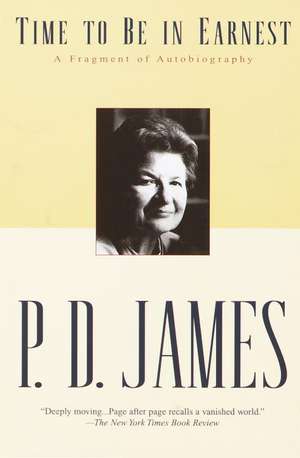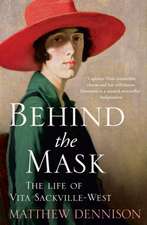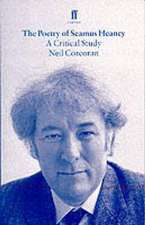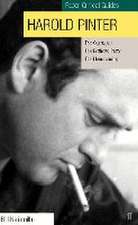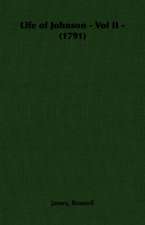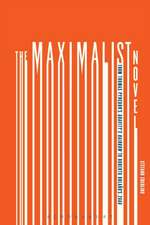Time to Be in Earnest: A Fragment of Autobiography
Autor P. D. Jamesen Limba Engleză Paperback – 31 ian 2001
Time to Be in Earnest offers an intimate portrait of one of most accomplished women of our time. Here are vivid, revealing accounts of her school days in Cambridge in the 1920s and '30s, her happy marriage and the tragedy of her husband's mental illness, and the thrill of publishing her first novel, Cover Her Face, in 1962. As she recounts the decades of her exceptional life, James holds forth with wit and candor on such diverse subjects as the evolution of the detective novel, her deep love of the English countryside, her views of author tours and television adaptations, and her life-long obsession with Jane Austen. Wise and frank, engaging and graceful, this "fragment of autobiography" will delight and surprise P. D. James's admirers the world over.
| Toate formatele și edițiile | Preț | Express |
|---|---|---|
| Paperback (2) | 70.54 lei 3-5 săpt. | +12.42 lei 6-12 zile |
| Faber and Faber – 31 oct 2000 | 70.54 lei 3-5 săpt. | +12.42 lei 6-12 zile |
| BALLANTINE BOOKS – 31 ian 2001 | 113.56 lei 3-5 săpt. |
Preț: 113.56 lei
Nou
Puncte Express: 170
Preț estimativ în valută:
21.73€ • 23.24$ • 18.12£
21.73€ • 23.24$ • 18.12£
Carte disponibilă
Livrare economică 27 martie-10 aprilie
Preluare comenzi: 021 569.72.76
Specificații
ISBN-13: 9780345442123
ISBN-10: 0345442121
Pagini: 306
Ilustrații: 16 PAGES OF PHOTOGRAPHS
Dimensiuni: 140 x 210 x 17 mm
Greutate: 0.27 kg
Ediția:Ballentine.
Editura: BALLANTINE BOOKS
ISBN-10: 0345442121
Pagini: 306
Ilustrații: 16 PAGES OF PHOTOGRAPHS
Dimensiuni: 140 x 210 x 17 mm
Greutate: 0.27 kg
Ediția:Ballentine.
Editura: BALLANTINE BOOKS
Recenzii
"Deeply moving . . . . Page after page recalls a vanished world."— The New York Times Book Review
"A cornucopia of discernment, judgment, and wisdom." —San Francisco Chronicle
"James neither overintellectualizes nor sentimentalizes. . . . Writing about commonplace events, [she] gives them weight and substance and so confirms their reality, investing them with a radiance that illuminates this fragment of autobiography." —The Washington Post
"A cornucopia of discernment, judgment, and wisdom." —San Francisco Chronicle
"James neither overintellectualizes nor sentimentalizes. . . . Writing about commonplace events, [she] gives them weight and substance and so confirms their reality, investing them with a radiance that illuminates this fragment of autobiography." —The Washington Post
Notă biografică
P.D. James is the author of 14 previous books, many of which have been adapted for television. She is the recipient of many honours, including the Cartier Diamond Dagger Award for Lifetime Achievement and 1999 Grand Master Award from the Mystery Writers of America. She lives in London, England.
From the Hardcover edition.
From the Hardcover edition.
Extras
Prologue
A diary, if intended for publication (and how many written by a novelist
are not?), is the most egotistical form of writing. The assumption is
inevitably that what the writer thinks, does, sees, eats and drinks on a
daily basis is as interesting to others as it is to himself or herself.
And what motive could possibly induce people to undertake the tedium of
this daily task--for surely at times it must be tedious--not just for one
year, which seems formidable enough, but sometimes for a lifetime? As a
lover of diaries, I am glad that so many have found time and energy and
still do. How much of interest, excitement, information, history and
fascinating participation in another's life would be lost without the
diaries of John Evelyn, Samuel Pepys, Virginia Woolf, Evelyn Waugh,
Fanny Burney and Francis Kilvert. Even the diary of a fictional
Victorian, Cecily Cardew in The Importance of Being Earnest, "simply a
very young girl's record of her own thoughts and impressions, and
consequently meant for publication," would have its appeal.
I have never up until now kept a diary, largely because of indolence.
During my career as a bureaucrat, a working day spent mainly in drafting
reports or speeches and writing letters or minutes left little incentive
for further writing, particularly the recording of trivia.
And any writing, if it is worth doing, requires care, and I have
preferred to spend that care on my fiction. My motive now is to record
just one year that otherwise might be lost, not only to children and
grandchildren who might have an interest but, with the advance of age
and perhaps the onset of the dreaded Alzheimer's, lost also to me. It
will inevitably catch on the threads of memory as burrs stick to a coat,
so that this will be a partial autobiography and a defence against those
who, with increasing frequency, in person or by letter, announce that
they have been commissioned to write my biography and invite my
co-operation. Always after my refusal there is the response, "Of course,
once you have died there will be biographies. Surely it's better to have
one now when you can participate." Nothing is more disagreeable than the
idea of having one now and of participation. Fortunately I am an
appallingly bad letter-writer and both my children are reticent, but at
least if they and others who enjoy my work are interested in what it was
like to be born two years after the end of the First World War and to
live for seventy-eight years in this tumultuous century, there will be
some record, however inadequate.
I have a friend who assiduously keeps a diary, recording merely the
facts of each day, and seems to find satisfaction in looking back over,
say, five years and proclaiming that "This was the day I went to
Southend-on-Sea with my sister." Perhaps the reading of those words
brings back a whole day in its entirety--sound, sense, atmosphere,
thought--as the smell of decaying seaweed can bring in a rush the essence
of long-forgotten summers. The diaries capturing adolescence, I suspect,
are mainly therapeutic, containing thoughts that cannot be spoken aloud,
particularly in the family, and a relief to overpowering emotions,
whether of joy or sorrow. A diary, too, can be a defence against
loneliness. It is significant that many adolescent diaries begin "Dear
Diary." The book, carefully hidden, is both friend and confidant, one
from whom neither criticism nor treachery need be feared. The daily
words comfort, justify, absolve. Politicians are great keepers of
diaries, apparently dictating them daily for eventual use in the
inevitable autobiography, laying down ammunition as they might lay down
port. But politicians' diaries are invariably dull, Alan Clark's being a
notable exception. Perhaps all these motives are subordinate to the need
to capture time, to have some small mastery over that which so masters
us, to assure ourselves that, as the past can be real, so the future may
hold the promise of reality. I write, therefore I am.
Perhaps some compulsive diarists write to validate this experience. Life
for them is experienced with more intensity when recollected in
tranquillity than it is at the living moment. After all, this happens in
fiction. When I am writing a novel, the setting, the characters, the
action are clear in my mind before I start work--or so I believe. But it
is only when these imaginings are written down, passing, it seems almost
physically, from my brain down the arm to my moving hand that they begin
to live and move and have their being and assume a different kind of
truth.
A diary, by definition, is a daily record. I very much doubt whether
this proposed record of one year in my life will be a diary within the
proper meaning of that word; certainly I can't see myself recording the
events of every day. I feel, too, that many social events can't properly
be mentioned since I have no intention of betraying confidences and some
of the most interesting things I learn are said to me in confidence. I
love gossip in other people's diaries, while recognizing that its
interest is in inverse proportion to its truth, but I suspect that this
record will have little to offer in the way of titillating revelations.
And to look back on one's life is to experience the capriciousness of
memory. When I was very young and leaving church with my mother, she
told me that the hymn we had sung, "Blessed Are the Pure in Heart," was
sung at the funeral of a friend of hers who had died in childbirth with
her baby during the great flu pandemic which followed the First World
War. Now I can never hear it without thinking of that young mother and
her child, both dead before I was born. No effort of will can banish a
vague unfocused sadness from my thoughts every time that hymn is sung.
And the past is not static. It can be relived only in memory, and memory
is a device for forgetting as well as remembering. It, too, is not
immutable. It rediscovers, reinvents, reorganizes. Like a passage of
prose it can be revised and repunctuated. To that extent, every
autobiography is a work of fiction and every work of fiction an
autobiography.
So tomorrow, on 3rd August, I shall write the first entry in a record
which I propose to keep for one year, from my seventy-seventh to my
seventy-eighth birthday. Will I persist with this effort? Only time will
tell. And will I be here at the end of the year? At seventy-seven that
is not an irrational question. But then is it irrational at any age? In
youth we go forward caparisoned in immortality; it is only, I think, in
age that we fully realize the transitoriness of life.
There is much that I remember but which is painful to dwell upon. I see
no need to write about these things. They are over and must be accepted,
made sense of and forgiven, afforded no more than their proper place in
a long life in which I have always known that happiness is a gift, not a
right. And there are other matters over which memory has exercised its
self-defensive censorship. Like dangerous and unpredictable beasts they
lie curled in the pit of the subconscious. This seems a merciful
dispensation; I have no intention of lying on a psychiatrist's couch in
an attempt to hear their waking growls. But then I am a writer. We
fortunate ones seldom have need for such an expedient. If, as one
psychiatrist wrote--was it Anthony Storr?--"creativity is the successful
resolution of internal conflict," then I, a purveyor of popular genre
fiction, and that great genius Jane Austen have the same expedient for
taming our sleeping tigers.
A diary, if intended for publication (and how many written by a novelist
are not?), is the most egotistical form of writing. The assumption is
inevitably that what the writer thinks, does, sees, eats and drinks on a
daily basis is as interesting to others as it is to himself or herself.
And what motive could possibly induce people to undertake the tedium of
this daily task--for surely at times it must be tedious--not just for one
year, which seems formidable enough, but sometimes for a lifetime? As a
lover of diaries, I am glad that so many have found time and energy and
still do. How much of interest, excitement, information, history and
fascinating participation in another's life would be lost without the
diaries of John Evelyn, Samuel Pepys, Virginia Woolf, Evelyn Waugh,
Fanny Burney and Francis Kilvert. Even the diary of a fictional
Victorian, Cecily Cardew in The Importance of Being Earnest, "simply a
very young girl's record of her own thoughts and impressions, and
consequently meant for publication," would have its appeal.
I have never up until now kept a diary, largely because of indolence.
During my career as a bureaucrat, a working day spent mainly in drafting
reports or speeches and writing letters or minutes left little incentive
for further writing, particularly the recording of trivia.
And any writing, if it is worth doing, requires care, and I have
preferred to spend that care on my fiction. My motive now is to record
just one year that otherwise might be lost, not only to children and
grandchildren who might have an interest but, with the advance of age
and perhaps the onset of the dreaded Alzheimer's, lost also to me. It
will inevitably catch on the threads of memory as burrs stick to a coat,
so that this will be a partial autobiography and a defence against those
who, with increasing frequency, in person or by letter, announce that
they have been commissioned to write my biography and invite my
co-operation. Always after my refusal there is the response, "Of course,
once you have died there will be biographies. Surely it's better to have
one now when you can participate." Nothing is more disagreeable than the
idea of having one now and of participation. Fortunately I am an
appallingly bad letter-writer and both my children are reticent, but at
least if they and others who enjoy my work are interested in what it was
like to be born two years after the end of the First World War and to
live for seventy-eight years in this tumultuous century, there will be
some record, however inadequate.
I have a friend who assiduously keeps a diary, recording merely the
facts of each day, and seems to find satisfaction in looking back over,
say, five years and proclaiming that "This was the day I went to
Southend-on-Sea with my sister." Perhaps the reading of those words
brings back a whole day in its entirety--sound, sense, atmosphere,
thought--as the smell of decaying seaweed can bring in a rush the essence
of long-forgotten summers. The diaries capturing adolescence, I suspect,
are mainly therapeutic, containing thoughts that cannot be spoken aloud,
particularly in the family, and a relief to overpowering emotions,
whether of joy or sorrow. A diary, too, can be a defence against
loneliness. It is significant that many adolescent diaries begin "Dear
Diary." The book, carefully hidden, is both friend and confidant, one
from whom neither criticism nor treachery need be feared. The daily
words comfort, justify, absolve. Politicians are great keepers of
diaries, apparently dictating them daily for eventual use in the
inevitable autobiography, laying down ammunition as they might lay down
port. But politicians' diaries are invariably dull, Alan Clark's being a
notable exception. Perhaps all these motives are subordinate to the need
to capture time, to have some small mastery over that which so masters
us, to assure ourselves that, as the past can be real, so the future may
hold the promise of reality. I write, therefore I am.
Perhaps some compulsive diarists write to validate this experience. Life
for them is experienced with more intensity when recollected in
tranquillity than it is at the living moment. After all, this happens in
fiction. When I am writing a novel, the setting, the characters, the
action are clear in my mind before I start work--or so I believe. But it
is only when these imaginings are written down, passing, it seems almost
physically, from my brain down the arm to my moving hand that they begin
to live and move and have their being and assume a different kind of
truth.
A diary, by definition, is a daily record. I very much doubt whether
this proposed record of one year in my life will be a diary within the
proper meaning of that word; certainly I can't see myself recording the
events of every day. I feel, too, that many social events can't properly
be mentioned since I have no intention of betraying confidences and some
of the most interesting things I learn are said to me in confidence. I
love gossip in other people's diaries, while recognizing that its
interest is in inverse proportion to its truth, but I suspect that this
record will have little to offer in the way of titillating revelations.
And to look back on one's life is to experience the capriciousness of
memory. When I was very young and leaving church with my mother, she
told me that the hymn we had sung, "Blessed Are the Pure in Heart," was
sung at the funeral of a friend of hers who had died in childbirth with
her baby during the great flu pandemic which followed the First World
War. Now I can never hear it without thinking of that young mother and
her child, both dead before I was born. No effort of will can banish a
vague unfocused sadness from my thoughts every time that hymn is sung.
And the past is not static. It can be relived only in memory, and memory
is a device for forgetting as well as remembering. It, too, is not
immutable. It rediscovers, reinvents, reorganizes. Like a passage of
prose it can be revised and repunctuated. To that extent, every
autobiography is a work of fiction and every work of fiction an
autobiography.
So tomorrow, on 3rd August, I shall write the first entry in a record
which I propose to keep for one year, from my seventy-seventh to my
seventy-eighth birthday. Will I persist with this effort? Only time will
tell. And will I be here at the end of the year? At seventy-seven that
is not an irrational question. But then is it irrational at any age? In
youth we go forward caparisoned in immortality; it is only, I think, in
age that we fully realize the transitoriness of life.
There is much that I remember but which is painful to dwell upon. I see
no need to write about these things. They are over and must be accepted,
made sense of and forgiven, afforded no more than their proper place in
a long life in which I have always known that happiness is a gift, not a
right. And there are other matters over which memory has exercised its
self-defensive censorship. Like dangerous and unpredictable beasts they
lie curled in the pit of the subconscious. This seems a merciful
dispensation; I have no intention of lying on a psychiatrist's couch in
an attempt to hear their waking growls. But then I am a writer. We
fortunate ones seldom have need for such an expedient. If, as one
psychiatrist wrote--was it Anthony Storr?--"creativity is the successful
resolution of internal conflict," then I, a purveyor of popular genre
fiction, and that great genius Jane Austen have the same expedient for
taming our sleeping tigers.
Descriere
In 1997, P. D. James turned 77. Taking to heart Dr. Johnson's advice that at that age it is "time to be in earnest", she decided, for the first time in her life, to keep a diary. The result is this frank and engaging memoir. Structured like the diary of a single year, "Time to Be in Earnest" roams back and forth through time, illuminating the extraordinary life P. D. James has led. Photos.
